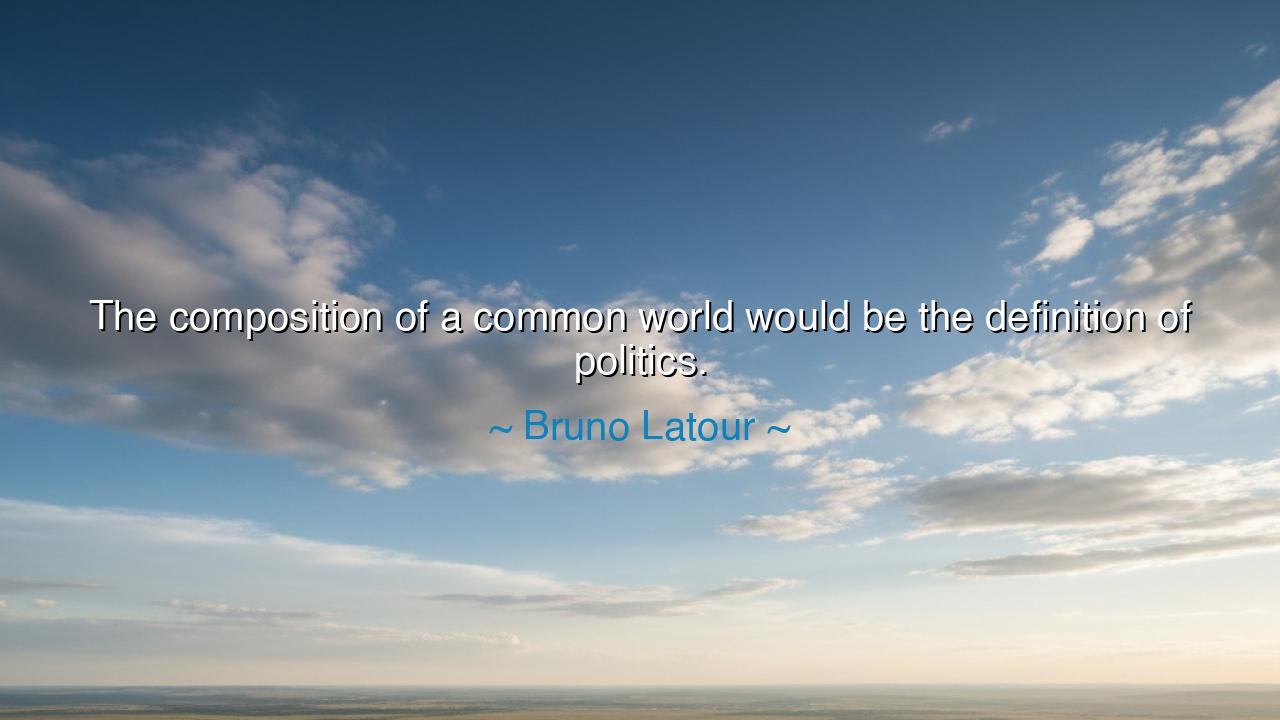
The composition of a common world would be the definition of






When Bruno Latour declared, “The composition of a common world would be the definition of politics,” he spoke as a sage of modernity, yet with the spirit of the ancients. His words remind us that politics is not merely the contest of parties, nor the hunger for power, but the sacred labor of building together. A common world is not inherited—it must be composed, piece by piece, through dialogue, compromise, and the weaving together of countless voices into a shared destiny.
The ancients understood this in their own way. In Athens, the citizens gathered in the agora, not simply to quarrel, but to imagine a city they would all inhabit. Rome, too, was bound together by the idea of the res publica—the “public thing,” a world held in common by its people. Latour’s teaching revives this spirit, reminding us that without the labor of composition, politics collapses into tyranny or chaos, and the common world dissolves into fragments.
History gives proof of this vision. After the devastation of World War II, the nations of Europe, once bitter enemies, began the slow work of composing a common world through institutions, treaties, and dialogue. The European Union, for all its flaws, was born from this truth: that the work of politics is not domination, but composition. From shattered cities and divided peoples arose a shared project that proved Latour’s definition in action.
His words also carry a warning. If politics is the art of composing a common world, then whenever leaders govern only for themselves, their party, or their tribe, they betray its essence. To deny others a place in the composition is to unravel the whole. For a world that is not common is no world at all, but a battlefield, where the strong devour the weak and the dream of community dies.
Thus, let this teaching endure: the true measure of politics is not victory but harmony, not conquest but composition. Every law, every debate, every act of governance should serve the task of building a common world, where each person finds belonging. This is the labor of generations, the song of humanity itself—to bind our differences into unity, and in that unity, to find the highest meaning of politics.






PNPham Nguyen
Bruno Latour’s view of politics as the creation of a common world challenges traditional political views. It suggests that politics is more about interaction and creation than simply ruling or governing. But does this mean that politics is always evolving? If the composition of the common world is always changing, how can we establish any long-term political goals or systems when the world itself is in constant flux?
TMNguyen Thi Tuyet Mai
I appreciate how Latour frames politics as something that involves building a shared world, not just maintaining power structures. But what does that look like in practice? Is politics only about the collective agreements we make, or does it also have to confront the disparities between different groups? Can we ever truly create a 'common world,' or are we always going to be navigating differences that prevent full cohesion?
QHHa Quang Huy
Latour’s idea about politics being the 'composition of a common world' is thought-provoking. It raises the question: if we can agree on what constitutes a 'common world,' then what does that world look like? Are there certain universal values that bind us together, or is politics about constantly negotiating and redefining those values? How do we balance individual identities with the idea of a collective world?
ATChuc anh thu
I find this quote intriguing because it challenges the conventional view of politics as just a set of institutions and power struggles. Latour suggests it’s about the very composition of society itself. But can we really define politics this way? If politics is about creating a common world, does it mean that everyone must participate equally in shaping that world, or are some voices inevitably louder than others?
MDNgoc Minh Doan
This quote by Bruno Latour makes me think about how politics isn’t just about laws or government—it’s about creating a shared reality that everyone is a part of. Does this mean that politics, at its core, is about collaboration, finding common ground, and building a world together? In a fragmented world where divisions seem more pronounced, how do we actually create that 'common world' that Latour is talking about?